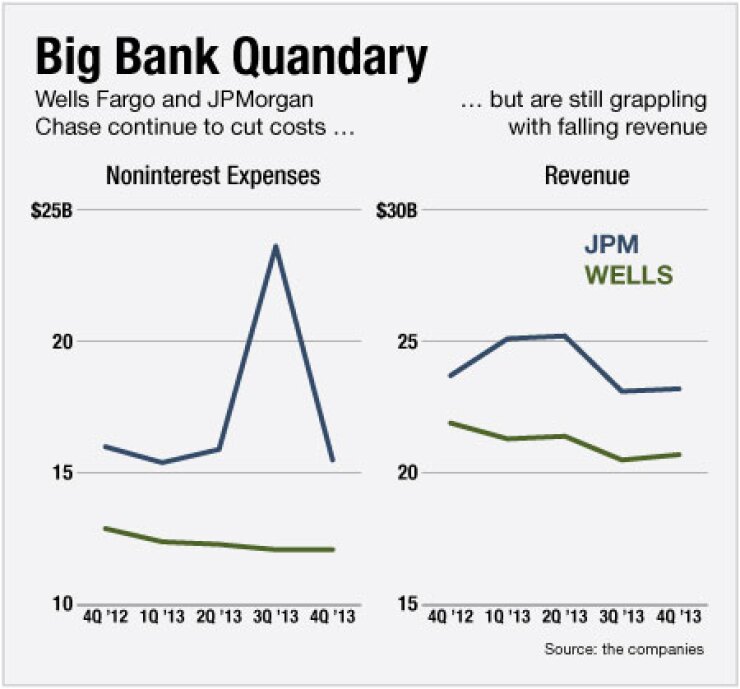-
JPMorgan Chase & Co. said profit fell 7.3% in the fourth quarter after $2.6 billion in settlements linked to Bernard Madoff's Ponzi scheme as legal costs ended a three-year streak of record annual earnings.
January 14 -
Manhattan U.S. Attorney Preet Bharara on Tuesday defended his decision not to prosecute JPMorgan Chase for allegedly facilitating Bernie Madoff's Ponzi scheme, calling a deferred-prosecution agreement and monetary penalty an "appropriate" resolution of the bank's alleged failings.
January 7 -
JPMorgan Chase's record $13 billion settlement has significant implications for the financial industry, but they may not be what casual observers expect. Following is a guide to the key takeaways from the deal.
October 20 -
The various orders, fines and acknowledgements of guilt made by JPMorgan Chase on Thursday over the London Whale and other issues will have enormous implications for the rest of the industry. Here's why.
September 19

Even if it occasionally costs $25 billion or so, it's good to be a big bank.
That seemed to be the lesson Tuesday at JPMorgan Chase (JPM), which shrugged off its most recent round of eye-popping settlement costs to
JPMorgan released $1.2 billion in reserves for its consumer banking operations, citing fewer losses on its credit cards and mortgages, and relied on more than $1.1 billion of one-time benefits from selling off some of its shares in Visa (NYSE:V) and a building in downtown Manhattan. The bank's net income was $1.30 per share, or $1.40 excluding one-time items, compared with the
Investors and analysts were largely content, if not overjoyed, with the bank's performance; shares were up less than 1% by midday. Like smaller rival Wells Fargo (WFC), which
"They certainly have their hands in a number of different businesses, and that's the idea behind diversification," says Jason Ware, an analyst with Albion Financial. "Investment banking was soft, but there are enough levers there that they can pull where, yeah, they bring in $5 billion in profit."
Besides one-time items, some of JPMorgan's levers this quarter included auto loan originations, which rose 16% year over year to $6.4 billion, and its large asset-management business, which reported a 15% jump in revenue, to $3.2 billion. Chief Executive Jamie Dimon also called himself optimistic about the overall economy and the potential positive impact that could have on the bank's businesses later this year.
"If you have a U.S. economy starting to grow, you will see loan growth. We actually are optimistic [about] the U.S. economy in particular," Dimon told analysts during a conference call Tuesday.
Dimon's leadership and risk management have been the subject of much criticism from regulators and industry observers, if not from his bank's investors, since its London trading office lost $6 billion in 2012. The bank has paid almost $25 billion in the past year to settle a wide array of criminal and civil charges, including a
Chief Financial Officer Marianne Lake on Tuesday indicated that most of the bank's big payouts are behind it, although she could not guarantee an end to its days negotiating with federal and state authorities.
"We do believe we have our [legal] reserves aligned to the issues as we know them," she told reporters during a conference call on Tuesday.
Costs from the massive fines dampened but did not derail JPMorgan's profits, which the bank's executives and investors have
"They're run by really smart managers," Ware says. "I would argue that [Dimon's] reputation has been tarnished to some degree given the London Whale debacle and the fines they've had to pay out but at the end of the day, I still think he's done some really great things and he has some respect in the power circles that matter the most."
Dimon last year successfully rebuffed a shareholder attempt to strip him of his chairman's title, and it currently appears unlikely that he will face a similar investor revolt this year. But the once-outspoken banker has been avoiding some of the showy or pugnacious rhetoric he became known for in better times.
On Tuesday, he was largely silent during a conference call with reporters while Lake, his CFO of one year, ran the show. Even when directly asked about his opinion of the newly finalized Volcker Rule, Dimon initially stayed quiet while Lake answered: "It's our best assessment right now that we will be able to be materially compliant with the rule" by its deadline, she said.
Pressed again for his opinion, Dimon would only allow that as the result of various changes to the capital standards, liquidity rules and trading restrictions for banks, including the Volcker Rule, "the system is significantly stronger."




